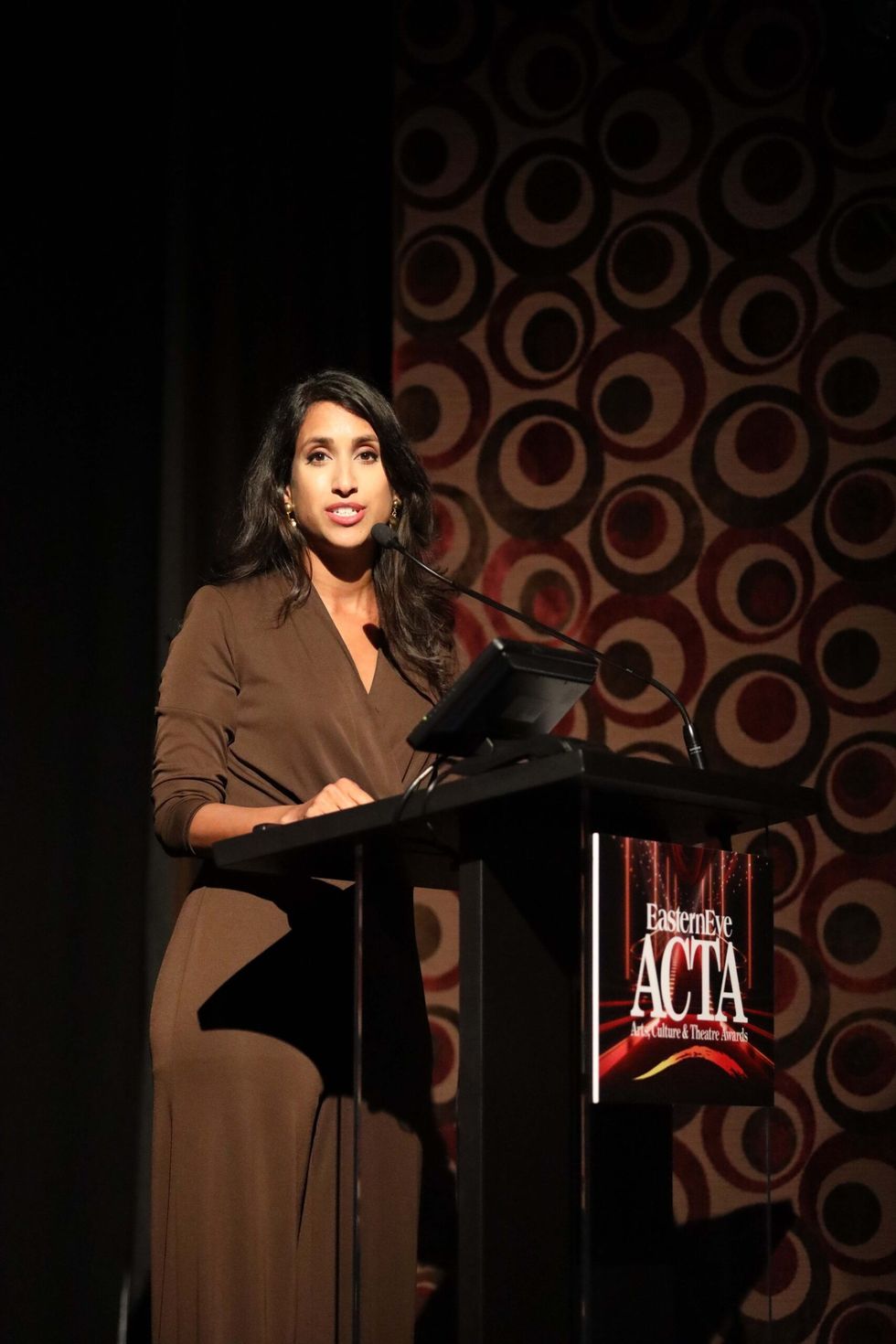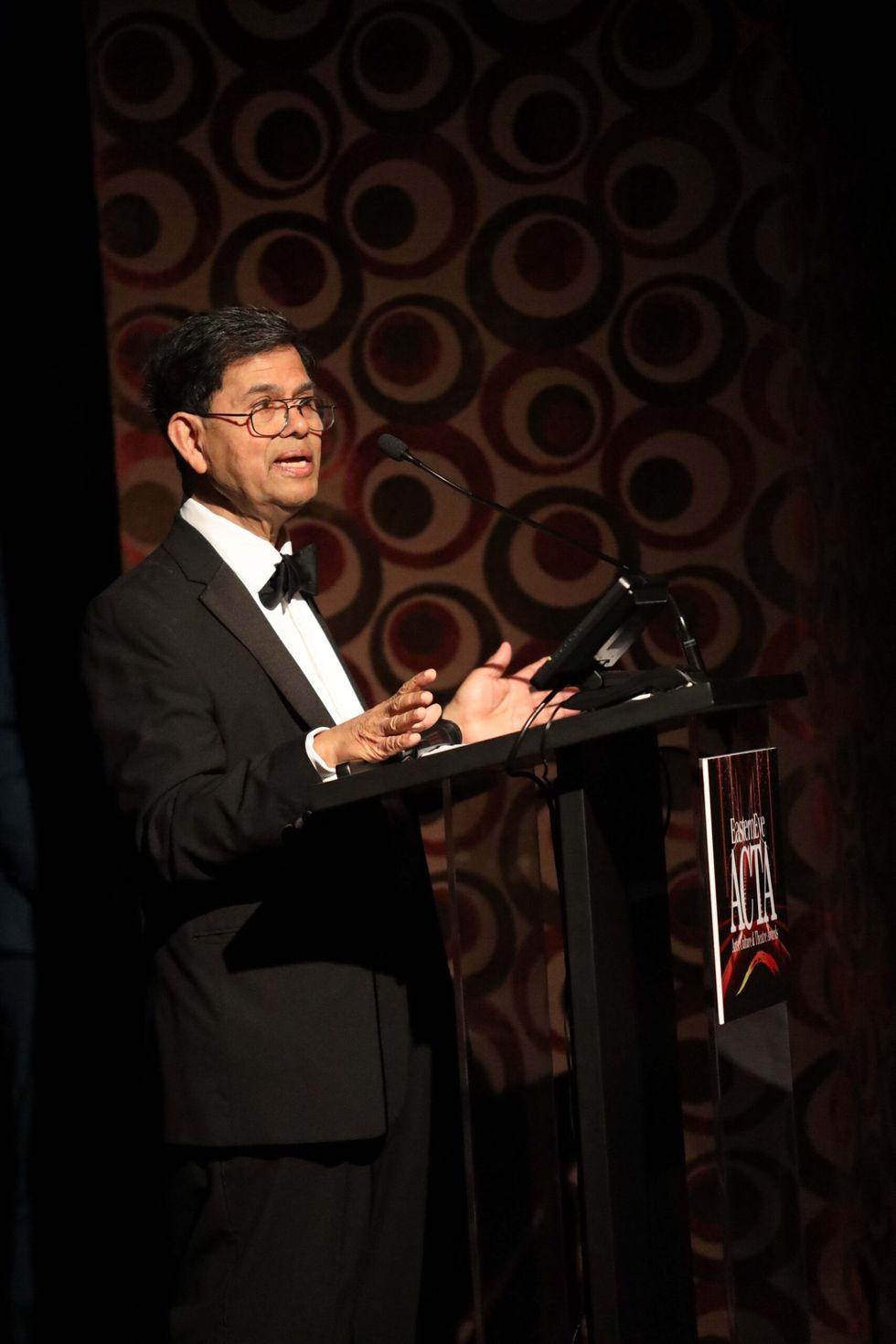SOME of the brightest talents from the British Asian community were recognised for their achievements in the arts at the annual Eastern Eye Arts, Culture and Theatre Awards (ACTAs) at the Mayfair Hotel in central London last Friday (17).
One of Britain’s most accomplished and versatile artists, Osman Yousefzada, won the Eastern Eye Award for Arts for his exhibition, Welcome! A Palazzo for Immigrants, which is now showing at the Venice Biennale.
The exhibition aims to break negative narratives about migrants. Mounted as a solo show in partnership with the Victoria & Albert Museum, it includes handcrafted textile works, prints, images and sculptures, illustrating the artist’s versatility and powerful imagination.
Yousefzada paid tribute to his family for inspiring him to become an artist. “I come from a family of makers – a cast of carpenters. They all made stuff,” he said.
A total of 21 awards were handed out at the glittering ceremony attended by leading figures from across the arts, including theatre, TV, film, radio and music.
The chief guest, Claire Coutinho, secretary of state for energy security and net zero, paid tribute to the artists in attendance, who she said contributed to bringing communities together.

“Our national life would be so much poorer were it not for the contribution made by the people in this room,” she said.
“It is shared cultural experience through television, theatre and music, but also in our everyday lives that makes us feel rooted in our communities and in our country. It is something I feel very passionate about because, without those shared cultural touch points in common references, it would be that much harder to understand each other and find common ground.
“I know that Eastern Eye has a proud history of fighting prejudice and discrimination. It is through events like tonight, recognising the amazing talent in the Asian community, that we can strengthen these cultural ties and also open up opportunities for people and ultimately lead to greater understanding across society.”
Three of the most high-profile awards of the evening went to inspiring women breaking new boundaries in the sector.
Indhu Rubasingham, who takes over as the artistic director and joint CEO at the National Theatre next year, took home the award for outstanding contribution to the creative industry.
The recognition made it a hat-trick of ACTAs for Rubasingham after she was named best director for White Teeth in 2019. Last year, she won the best director ACTA for a second time, for The Father and the Assassin, which was staged twice at the National Theatre.
Playwright Tanika Gupta will team up with actress Meera Syal for A Tupperware of Ashes at the National Theatre in September. They both picked up ACTAs, with Gupta claiming the trailblazer award for a 30-year career in theatre and TV, while Syal was recognised for her hit series, Mrs Sindhu Investigates, as she was named best actress in a film, TV or drama.
Meneka Das collected the best director award for Gupta’s critically-acclaimed play, A Doll’s House, which was performed at the Questor’s Theatre in Ealing, west London, earlier this year.
A Doll’s House was described by the awards judges as “subtle and transfixing, leaving many audience members stunned and awed by the whole production”.
Set in Calcutta [now Kolkata] in 1879, Gupta and Das reimagined Ibsen’s classic play of gender politics and the themes of ownership and race through the lens of British colonialism, offering a female perspective of the experiences of Indian women married to Englishmen.
“Being born in India and then (having) lived here (UK) gave me that confidence to step up and bring my own original take on Tanika’s story and her adaptation of the play,” said Das.
“It was exciting, because I had an amazing set of actors who were willing to go with me where the story took us.”
Accomplished actor Bhasker Patel was recognised for playing Rishi Sharma in Emmerdale for 12 years, as he took home the best actor award in the film, TV and drama category.
Rising star Lucca Chadwick-Patel won the award for best actor, theatre, for his lead performance as Omar in Hanif Kureishi’s My Beautiful Laundrette at The Lowry in Manchester.
“My Beautiful Laundrette is a beautiful story about love and acceptance,” said Chadwick-Patel. “We took it across the north mainly, which is my home, which was just amazing.”
The best actress, theatre, award went to Aysha Kala for her performance in the Sam Mendes-directed The Motive and The Cue at the National Theatre.
The plays tells the story of the rivalry and friendship between two of the great British actors of their day – Sir John Gielgud directing Richard Burton in an experimental new interpretation of the classic Shakespeare play, Hamlet.
Kala played Jessica Levy – an assistant to Sir John, in a critically acclaimed performance. She also starred last year as Vimla in the memorable The Father and the Assassin.
“I had such an incredible time on both The Motive and the Cue and The Father and the Assassin working with two outstanding companies,” she said.
“Thank you to the National Theatre and to Sam and Indhu (Rubasingham) for having me on board.”
Shomit Dutta was named best scriptwriter for his play Stumped, which premiered last year and had a popular run at the Hampstead Theatre in London.
Stumped was about a cricket match and an imaginary conversation between two great writers – playwright Sir Harold Pinter, and novelist and dramatist Samuel Beckett.
Dutta revealed that the Covid pandemic was the catalyst for the play.
“The idea came from being stuck at home. I used to go to Hackney Marshes and there’s a cricket ground, there’s nets, but nothing else. And it was very near where Harold Pinter lived. I’ve always loved their work and I thought what about putting them somewhere where they are together,” he said.
The Birmingham Repertory Theatre’s Bhangra Nation collected the best production award.

Powered by the music of British bhangra icon Kuljit Bhamra, this was a north American show that got a British makeover earlier this year and proved a hit with both audiences and critics.
Written by Rehana Mirza and her husband Mike Lew, it tells the immigrant story through music, with two students on a journey of discovery as they enter the national university dance competition.
Renowned artist Najma Akhtar was the winner of the Music Award for her album Five Rivers. Known for being influenced by ghazals, jazz and Sufi music, Akhtar said she was inspired by “spirituality, improvisation, magic, peace, love, poetry”.
The Dance Award went to Jaivant Patel for Waltzing the Blue Gods. Based on Indian mythology, spirituality and imagination that allows for a conversation which centres around LGBTQIA+ (plus) narratives, it leads to the marginalised to be seen, heard and embraced.
Hermann Rodrigues took home the Photography Award for amassing more than 400,000 photographs after becoming fascinated with Asian culture in Scotland. His work has been on display at the Commonwealth Institute in London, the National Museums of Scotland and the National Libraries of Scotland.
Author and broadcaster Kavita Puri who explored Partition through her book and BBC radio series of the same name, Partition Voices: Untold British Stories, won the best presenter ACTA for her look at another tragic moment in British-Indian history – the Bengal Famine.
Her BBC radio series, Three Million, told the story of the three million Indian people under British colonial rule, who died in the famine during the Second World War.
The winner of the best documentary award, Defiance – Fighting the Far Right, revealed the struggles of British Asians to find a sense of belonging in the UK.
Sheela Banerjee’s book, What’s in a Name? won her the best non-fiction ACTA. She reflected on how the project started as a personal journey, but she quickly found that names contained narratives of their own, indicating often the cultural inheritance of the person and a commentary also on colonialism, legacy and migration.
The ACTA award for best fiction went to Tongues and Bellies from the Whole Kahani – a collective of British fiction writers of south Asian origin who came together in 2011 to provide a creative perspective of the Asian experience.
The group collaborates, hosts workshops and publish collectively.
The Whole Kahani has published three anthologies in all so far – Love Across a Broken Map in 2016; May We Borrow Your Country in 2019 and its latest is Tongues and Bellies.
“We wanted to be trailblazers and have a space where we could be free to write about anything we like,” The Whole Kahani co-founder, Kavita Jindal, said.
“We really mean anything in the world, anyone from any country, not just ourselves. In fact, behind us, there are many other collectives and people working together,” she added.
The inaugural Eastern Eye award for History went to professor Joya Chatterji for Shadows at Noon: The South Asian Twentieth Century.
Judges described the book as “a brilliant and authoritative history of the Indian subcontinent” that could be dubbed a “romantic history”, exploring culture, faith, food and customs in a way that has never really been done before.
The book rails against narratives of inherent differences between India, Pakistan and Bangladesh and reveals the many things its people have in common.
Chatterji paid tribute to her aunt, her father’s widowed sister, who she described as a poetist and a Maoist.
“She was the most important influence on my life,” said Chatterji.
“She was a very curious and contradiction of characteristics. She wore the widow’s whites, she ate the widow’s diet. But she was a very ardent Naxal.
“My father went to school with the founders of Naxalism and these were all her friends. She was such an ardent Maoist. She travelled several times to China.
“I grew up on the tales of the Mahabharat, Jai Bhim and Naxalism. I thought it was perfectly normal to be a Naxal – this was just normal, everyday education. I didn’t think it was at all contradictory. I thought I’d put it into the book because its history is amazing.”
The Eastern Eye community engagement award went to the Royal Academy for Entangled Pasts 1768 to now – Art, Colonialism and Change.
The exhibition features 100 works from greats such as JMW Turner and Joshua Reynolds, and work from artists working in this century, including Bharti Parmar, Mohini Chandra, The Singh Twins, Yinka Shonibare, Lubaina Himid, and Hew Locke, among others.
The MK Gallery’s exhibition, Beyond the Page: South Asian Miniature Painting and Britain 1600 to Now received the Eastern Eye editor’s special award.
Curated by Anthony Spira and Hammad Nasar, the exhibition brought one of the widest collections of miniature south Asian work ever seen together.
It explored how the traditions of south Asian miniature paintings have been reclaimed and reinvented by contemporary artists, and taken forward from illustrated manuscripts to experimental forms that include installations, sculpture and film. Some the work had never been seen before in public.
The Eastern Eye ACTAs were sponsored by Arts Council England; Edwardian Hotels London; the Hinduja Foundation; Koolesh Shah Family Foundation; and Yusuf & Farida Hamied Foundation.




















